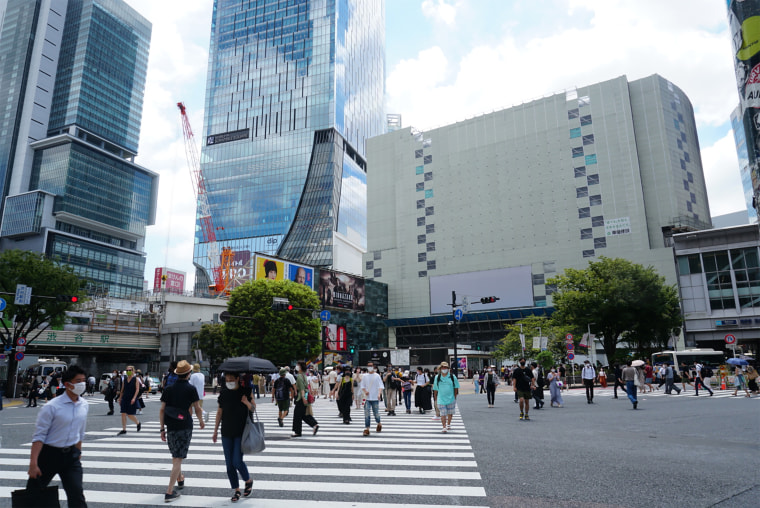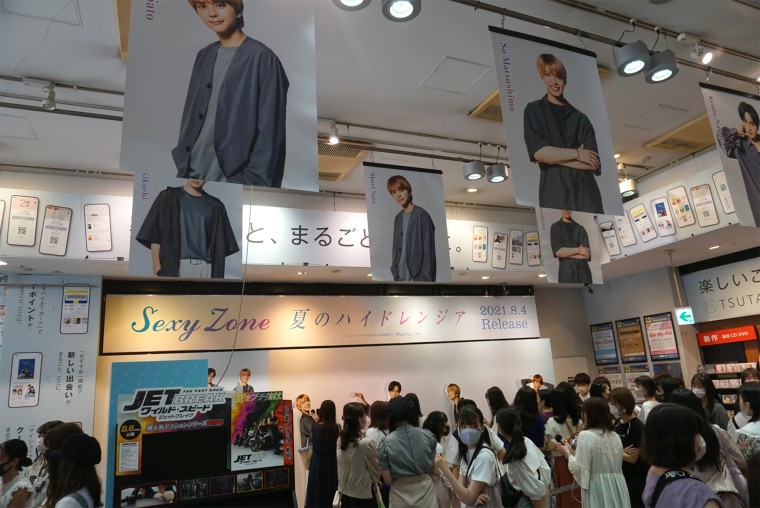TOKYO — For 16 years, Kichitaro Kawada has taken Tokyo’s temperature from his perch at the Kishimoto newsstand in Shibuya Crossing, which is billed as the busiest intersection in the world.
In recent weeks, he’s noticed the small talk with regular customers shifting from worries that the Tokyo Olympics would worsen the Covid-19 crisis to “the Japanese are winning medals,” Kawada told NBC News.
Kawada, who unlike many of his countrymen has been pro-Olympics from the start, said he’s also seen an uptick in newspaper purchases by customers eager to read about the latest exploits of Team Japan.

“I noticed because people don’t buy newspapers as much anymore,“ Kawada said via a translator.
But Kawada, who was a teenager when Tokyo hosted the Summer Games for the first time in 1964, said that “there was more Japanese spirit then.”
“With these Games, there is not the same passion,” Kawada said. “I just hope it ends safely.”
The sentiment was echoed in interviews with other Japanese people at Shibuya Crossing, which is like the Times Square of Tokyo and where every few minutes as many as 3,000 pedestrians cross the street from several different directions all at once in a display of blacktop ballet that’s come to be called the “Shibuya Scramble.”
And it’s been reflected in other recent man-on-the-street reports of the Japanese showing a grudging and gradual acceptance of these Olympics Games as the home team has racked up an impressive 38 medals as of Wednesday, half of them gold.
Download the NBC News app for breaking news and politics

Just before the Games got underway on July 23, a poll by Asahi Shimbun, one of the largest national daily newspapers, found that despite the best efforts of local organizers and the International Olympic Committee, much of the Japanese public were opposed to holding the Games.
Over at the Shibuya Choraku, a Japanese-owned Chinese restaurant, chef Hideki Odagawara said he was among the many who questioned the wisdom of holding the Games during a pandemic but is now happy that “Japan is winning medals and that it’s in Tokyo.”
“I just wish it wasn’t being held this year,” said Odagawara, adding that it would be easier “to show off Tokyo” if there wasn’t a pandemic.
Because of Covid-19 restrictions, the big burst of business from overseas tourists never happened, although of late there has been a trickle of “visitors” coming by for a nosh after completing their quarantines.
An Italian TV news crew was filming a segment near the statue of Hachikō, the Akita who faithfully waited for his master outside the Shibuya Station for 10 years and whose story was transplanted to America in the 2009 Richard Gere movie, “Hachi: A Dog’s Tale.”
Waiting there recently was art student Yamada Wakana, 20.
Asked for her take on the Olympics, Wakana said young people like her are following the Games but admitted that it was hard to work up a lot of enthusiasm “because we can only watch them on TV.”
Wakana said that Covid-19 restrictions and the state of emergency that has barred fans from the stands has made it “less of an event.”
“Younger people want to meet up and support the Japanese team but can’t because of Covid,” she said.

Across the street, near a Starbucks, a long line of teenage girls waited for their turn to take a photograph with an enormous poster of the Japanese boy band “Sexy Zone,” who released a new single Wednesday.
Ayako Kato and Ayano Hirai, both 18, said they’ve been watching the Olympics at home with their families.
“We’re into it, but today ‘Sexy Zone,’” said Hirai and both giggled.
